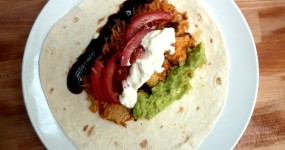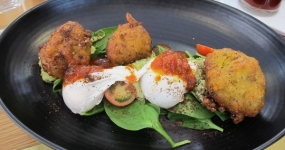I quit sugar? Do I bollocks.
The Hype
For the ‘I quit sugar’ movement, sugar is an insidious poison liberally and sneakily added to processed foods, rotting our teeth and making us all fat. What’s more, it apparently as addictive as cocaine or even heroin.
The Beef
Seem exaggerated? It is. But besides the hyperbole and lack of concrete scientific evidence to back it up, my main beef with the #iqs movement is that they don’t actually quit sugar at all. They quit fructose. ‘I quit fructose’ doesn’t quite have the same ring to it, but iqs-ers never let the truth get in the way of a good hashtag. Because wtf is #iqf? Our #iqs chums really believe that fructose is poison, meaning that for them, it’s preferable to eat a half a cup of rice malt syrup to an apple, which seems insane.
The Fine Print
Is fructose poisonous? Fructose (not high fructose corn syrup) occurs naturally in fruit, but it is also present in many other foods; table sugar or caster sugar, for example, is 50% sucrose and 50% fructose. Fructose also occurs in high levels in many processed foods such as fruit juice (with juice you get all of the sugar, all of the calories and none of the fibre). Fructose may or may not be a problem for most of us (i.e. those of us without a sensitivity or allergy to it); the jury’s still out. Experts mostly agree that sugar is sugar, and that excessive sugar consumption does contribute to obesity and ill health. Substitutions for fructose such as rice malt syrup, the darling of the #iqs baking scene has an incredibly high glycemic index and a high glycemic load, higher than that of fructose or caster sugar. I question whether the spike in blood sugar caused by a spoonful of rice malt syrup (sugar) would be any better for you than that from a spoonful of golden syrup, which has the highest calorie-to-liquid ratio of all the syrups (and consequently is also my favourite of all syrups).
The Verdict
It would be so much simpler if we could just point the finger at fructose, or even sugar, and be done with it. But being fit and healthy is down to so many more factors than a specific kind of sugar. It’s true that sugar has overall been found to be quite addictive, blood sugar spikes are not good for you, and there is added sugar (and salt and god knows what else) in most processed foods. Obviously the food industry would love to have us believe that sugar ‘in moderation’ is fine, and let’s not worry too much about what ‘moderation’ means. But the ‘sneakiness’ of ‘hiding’ sugar in foods is not itself an argument for cutting out sugar or fructose from our diets.
So wtf should I do?
Sugar has been linked to obesity for the simple reason that sugar is energy; it is incredibly high in calories/kilojoules. It is also a problem because we often don’t take it into account day-to-day – bottled fruit juice, for example, has the same amount of sugar as coca cola, but we generally consider it ‘healthy’ and therefor ‘not fattening’, forgetting that ‘healthy’ foods can be incredibly high in calories; the fact that a food may be beneficial to your health tells you nothing about its caloric content whatsoever. Limiting or even cutting out added sugar completely can even out energy rushes and mood swings so that we may find we ‘feel better’ when we limit or eliminate it.
Sugar can be fun, it can be delicious, it can be addictive, it can be a lot of things, but it isn’t poison. So take the I quit sugar movement’s advice, or any nutritional advice from unqualified ‘experts’ (including me) with a grain of sugar. While it’s true we’ve overlooked the surreptitious sugar-ladening of our food for far too long, the solution is not to whip up a batch of rice-malt-syrup-and-ground-date-sweet-potato-brownies and scoff the whole pan. If you want to cut sugar or even just get a better handle on how much sugar you’re eating, then ditch highly processed foods and the baking altogether. It is really that simple.
About me
 Sharing easy recipes, hunting down the best coffee. Honest accounts, nothing too serious. Read more...
Sharing easy recipes, hunting down the best coffee. Honest accounts, nothing too serious. Read more...Recent Posts
- Aerpress means no more shit #travelcoffee and #workcoffee
- Why I write and four ace bloggers who do it better
- The five best things I ate in London
- Shoreditch is awesome, airports are not
- I quit sugar? Do I bollocks.
- Cubao Street Food, Alexandria
- The Reformatory Caffeine Lab, Surry Hills
- Brewtown Newtown
- Stay caffeinated over Christmas
- Gumption by Coffee Alchemy, Sydney CBD
Popular posts this month…
 Sparkling Long Black posted on May 10, 2011
Sparkling Long Black posted on May 10, 2011  Bake Sale vs. Cake Stall posted on August 30, 2013
Bake Sale vs. Cake Stall posted on August 30, 2013  Review – Philips Saeco Intelia posted on January 10, 2012
Review – Philips Saeco Intelia posted on January 10, 2012  Lemonade Scones and family recipes posted on February 25, 2011
Lemonade Scones and family recipes posted on February 25, 2011  How not to order a takeaway coffee posted on March 15, 2011
How not to order a takeaway coffee posted on March 15, 2011  The quest for Mex part 2 – Feisty Chicken Burritos posted on December 21, 2010
The quest for Mex part 2 – Feisty Chicken Burritos posted on December 21, 2010  Lau’s Ultimate Corn Fritters and the four fritter truths posted on March 1, 2013
Lau’s Ultimate Corn Fritters and the four fritter truths posted on March 1, 2013  Café review – Flint and Steel (Coffee Alchemy), Marrickville posted on March 1, 2011
Café review – Flint and Steel (Coffee Alchemy), Marrickville posted on March 1, 2011
Disclaimer:
All opinions in this blog are mine, an everyday, real-life person. I do not accept payment for reviews and nor do I write sponsored posts. I do not endorse the content of the comments herein.








